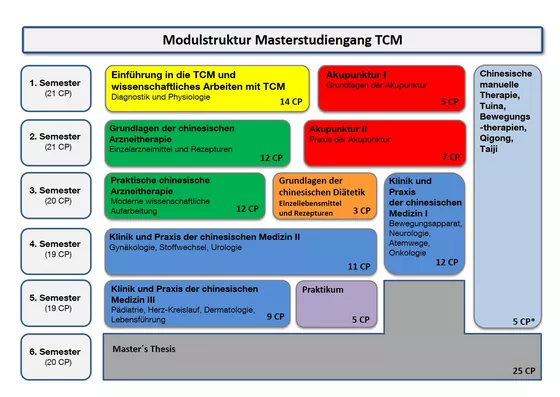Target groups
The study program addresses doctors with previous practical experience, who wish to obtain further qualifications in the field of TCM or who want to specialize in this field. A prerequisite is a medical State examination. This limitation to medical practitioners should serve to provide a common base of knowledge and a common background of experience which thereby supports the learning success of the group.
Qualification profile
Those who have completed this course of studies, along with the aid of two cognitive systems and the thereby associated, methodical diversity, are able to establish a detailed diagnosis, even in such cases where the pure western approach may possibly have resulted in no findings. Through the mastery of a broader basis of therapeutic possibilities, you can develop a more differentiated therapy, which is oriented even more intensively than to date on the needs of the individual patient.
Those who have completed the TCM Masters course of studies are able to integrate and elaborate on questions associated with TCM in the context of scientific research. They can formulate research questions, develop experiments or research designs, implement these and interpret the results in a scientific context.
Occupational prospects
More than half of the public desires a physician with additional alternative/complementary medical training. Here, Traditional Chinese Medicine (TCM/acupuncture) stands at the forefront.
In German-speaking countries there is presently no universal, fully Bologna-compliant course of studies. This Masters course of studies, which is not only pioneering on a university level, also takes into account a demand which has existed for decades. Many institutes of higher learning and clinics would like to develop a department for TCM and there is intensive need for this in the outpatient area.
The attractiveness on the occupational market can be described as being excellent, since well-trained physicians in this field are urgently needed not only in all facilities, but also for ambulatory care.
Therefore it must be assumed that the initially 30 graduates per year can only serve to fulfill a small percentage of those needed throughout all of Germany.
This is highly attractive for students in this Masters course of studies since there is no alternative university training in the German-speaking countries and the only training available to date from the medical specialist societies does not nearly offer such qualifications. Thus, courses of training in medical specialist societies presently represent a maximum of one-third of that planned in the curriculum for this course of studies.
Conclusion of such an additional medical training with a "Master of Science" degree provides a high degree of integrity externally relating to this course of studies, that is to society, to the public, to the medical societies, to colleagues and to the scientific medical world. Internally, it promises the satisfaction and safety to be obtained from a comprehensive, in-depth academic training field which is appropriate and practically relevant.
Language skills
The courses and examinations in the field of studies of Traditional Chinese Medicine are carried out in German. Lectures from international experts may also be provided in English.
Registration
Authorized are only those applicants who are able to verify their subsequent university degree:
- through successful completion of a State examination (second part of the medical exam) at a German university in a medical field of study
- conclusion of a course of studies equivalent to that above at a foreign university.
The selection process is carried out based on a two-stage suitability procedure. In the first stage, the committee evaluates the documents submitted. The following evaluation criteria are included:
- Final grade
- Motivation letter
- Professional qualifications specific to this course of studies
Dependent on the number of points acquired in the first stage, either the direct approval is issued and followed by an invitation to Stage 2, or the application is rejected. In the course of the second stage of the suitability procedure, the qualifications acquired in an initial course of studies and the results of the selection interview are evaluated. The qualifications acquired in an initial course of studies is taken into consideration to at least the same degree. The contents of the interview covers the following topics of priority:
- interests and experiences in the occupational field of Traditional Chinese Medicine
- understanding of scientific and of fundamental- and method-oriented modes of practice
- oral language skills
The submitted documents can also play a role.
Detailed information on the suitability procedure can be found in Annex 2 of the professional study and examination regulations.
Due to the seminar-like character of this event and the intensive confrontation with this topic, an attempt will be made to obtain a maximum group size of 30 - 35 students.
There will be a minimum of 20 students. After approval through the suitability procedure, successful applicants will be informed that their approval is only valid in the event that the minimum number of participants is reached by the effective date. Should this minimum number of participants not be reached by the defined effective date, this course of studies will not be offered in this semester. The applicant has no claim for the realization of this course of studies.

